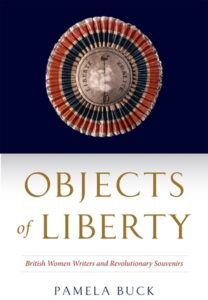
Pamela Buck
Hardback
March 2024 • ISBN 9781644533338 • $150.00
Paperback
March 2024 • ISBN 9781644533321 • $42.95
* E-Book Available
Order Online
Series
Early Modern Feminisms
While souvenir collecting was a standard practice of privileged men on the eighteenth-century Grand Tour, women began to partake in this endeavor as political events in France heightened interest in travel to the Continent. Objects of Liberty: British Women Writers and Revolutionary Souvenirs explores the prevalence of souvenirs in British women’s writing during the French Revolution and Napoleonic era. It argues that women writers employed the material and memorial object of the souvenir to circulate revolutionary ideas and engage in the masculine realm of political debate. Looking at travel accounts by Helen Maria Williams, Mary Wollstonecraft, Catherine and Martha Wilmot, Charlotte Eaton, and Mary Shelley, this study reveals how they used souvenirs to affect political thought in Britain and contribute to conversations about individual and national identity. Objects of Liberty is a story about the ways that women established political power and agency through material culture. Easily transported across borders due to their small size, souvenirs allowed women to provide visual representations of the distant conflict in France and encourage sympathy for and remembrance of revolutionary ideals. At a time when gendered beliefs precluded women from full citizenship, they used souvenirs to redefine themselves as legitimate political actors. By establishing networks of sociability, women’s exchange of souvenirs helped Britain develop international alliances and redefine itself as a more powerful and global nation.
About the Author
Pamela Buck is Associate Professor of English at Sacred Heart University in Fairfield, Connecticut. Her research focuses primarily on women’s writing and material culture in late eighteenth- and early nineteenth-century British literature.

